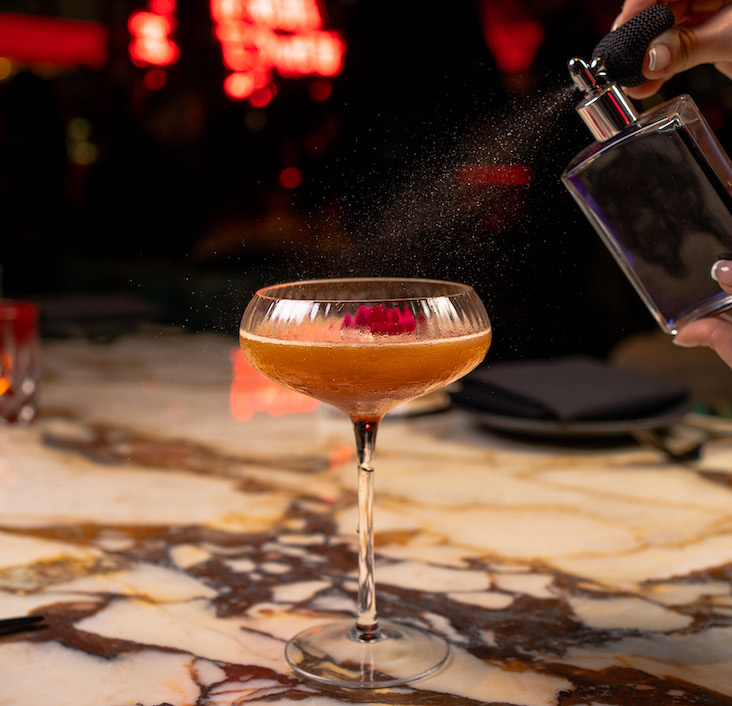The folks at Bar Rescue have seen it all in rehabbing the failing bars featured on the Spike network series. Several beverage experts that have been featured on episodes participated in a panel during the 2015 Nightclub & Bar Convention and Trade Show in Las Vegas on March 30.
Moderated by Thom Greco, owner/president of restaurant management company Greco Holdings, panelists Mia Mastroianni, Nick Liberato and Phil Wills offered up several tips to help bars and bartenders succeed. Bar Rescue host and co-executive producer Jon Taffer made a surprise appearance and urged attendees to take everything they’re learning and “go back and do it…cause we don’t want to have to come and rescue you!”
Here are just a few of the tips from the Bar Rescue experts panel.
1) Bar set-up is crucial. Make sure the bar is set up with everything you need before a shirt. “I set up my station so I never have to leave it,” said Mastroianni, a cocktail engineer at Soho House West Hollywood.
And be sure to look over the garnishes before the shift starts, she added: “If the limes have turned, throw them out!”
2) Aim to “wow” your guests. What’s the “wow” factor when a customer comes into your bar or restaurant, said Liberato, executive chef of The Venice Whaler in Venice, CA. “What are people craving, ‘wowing’ about that they are going to come back to you for,” he noted.
Bars and bartenders “are in the business to create reactions,” said Wills, a partner in The Spirits in Motion beverage consultancy in Los Angeles. “I take little wows from everywhere I go and incorporate them into my place.” Wows can range from music, lighting and decor to drink garnishes or even a spotless rest room.

Bar Rescue host and co-executive producer Jon Taffer (left, with moderator Thom Greco), pops in on the panel.
3) Focus on “moments of truth.” Customers do three things when they come into your bar, Wills said: They look around the bar; they consume your beverages and food; and the converse—either with the people they came with or with the bartender/server. All of these are opportunities to make a positive—or negative impression.
A bartender in a dirty shirt, for instance, is a negative moment of truth, Wills said; so is a wad of chewing gum stuck under the bar. Work to eliminate the negatives so you can focus on the wows.
4) Keep it clean—always. Cleanliness is a common theme in Bar Rescue shows—a lot of the operations that are in financial trouble tend to have lackluster hygiene when the experts start poking around.
Bars need to be cleaned constantly and also require a regular deep cleaning or they start to smell, Mastroianni said: “If you get to the point where your bar smells, you’re past the point of a deep clean.”
She recommended a cleaning schedule, so that on Mondays, for example, you empty the refrigerator (where, she added, everything should be labeled and dated), and clean the glassware station, etc.
Wills said he uses a “beautification list” of cleaning projects for bartenders or even barbacks to work on during down time, from cleaning doors and hinges to dusting the TV and artifacts on display behind the bar.
Beyond the bar, Liberato said, take a walk around the palace—inside and outside. Are there cigarette butts on the ground in front of the bar? Is the sign straight? Is there dust in the vents, are there scuff marks on the leather banquets or bar stools? All these little things affect customer perception of your establishment.
And never underestimate the state of the bathroom, he added: “It’s a sure sign of what you’re going to get at a place.”
5) Consistency is key. Standardize drink recipes and liquor pours, Mastroianni said. Try the Cosmo Test: Have five of your bartenders each make you a Cosmopolitan. If the bartenders are not all on the same page, the cocktails are going to look and taste different.
This is a problem, Wills concurred, because if someone has a great drink at your bar and they return to order it again but it doesn’t look or taste the same, “that’s a negative moment of truth.”
6) Cross train your bar/kitchen team. Liberato is a fan of having the front-of-the-house employees do a shift in the kitchen. It’s helpful to be able to have someone that’s able to jump into another role in a pinch, but when they get their hands into making the food, they better understand the preparation and it creates passion, he said.
“Server numbers go up after they’ve put in an eight-hour shift in the kitchen,” Liberato added, because they can explain to customers exactly how a dish is made, and they tend to be more enthusiastic about it.
7) Hire bartenders with the right personality and attitude. Look for charisma, approachability, friendliness and passion for service, Wills said. That’s generally more important than experience. You can teach someone how to make drinks, Mastroianni agreed, “but you can’t teach passion.”
For more from Bar Rescue, see Jon Taffer On Why Bars Fail.








